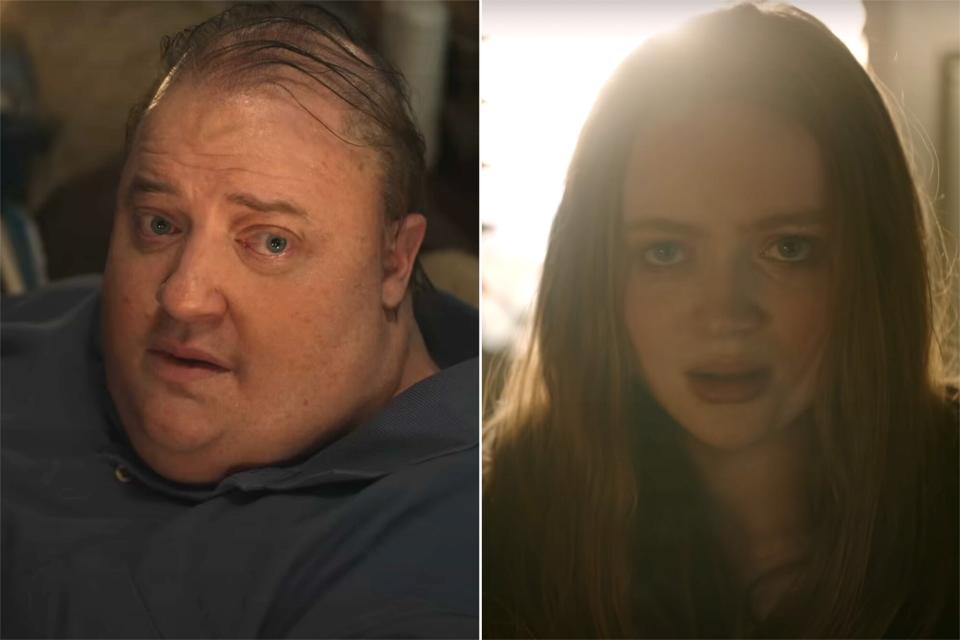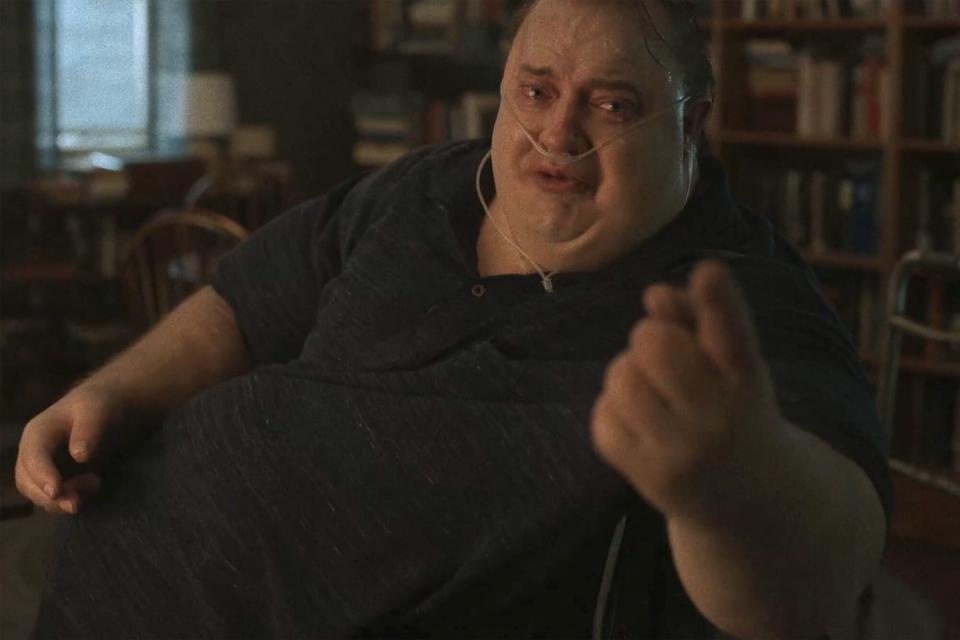The Whale ending explained: Brendan Fraser breaks down Charlie and Ellie's final scene
- Oops!Something went wrong.Please try again later.
Warning: This article contains spoilers for The Whale.
It's easy to get swept up in the emotions of Darren Aronofsky's searing drama The Whale, which follows Brendan Fraser as Charlie, a reclusive, 600-pound literature professor struggling, in the last days of his life, to reconnect with the teenage daughter, Ellie (Sadie Sink), whom he abandoned years prior. The film's conclusion, however, might be more difficult for some viewers to read, so we asked Fraser and screenwriter Samuel D. Hunter to break down what the final scene means for Charlie's journey.
The film slowly builds to a key moment for the father-daughter pair, after Charlie spends most of the movie defending Ellie's sporadic outbursts and prickly, wounded disposition — particularly to his longtime caregiver and friend, Liz (Hong Chau). Charlie maintains that Ellie, like most people, has an innate capacity for empathy, and regularly heralds one of her blunt, years-old school essays criticizing the classic novel Moby Dick. He see it as a signifier of her purity, honesty, and unbridled passion. Still, Ellie remains skeptical of Charlie during most of the film's running time.

A24 'The Whale' ending explained as Brendan Fraser breaks down that heartbreaking final scene between Charlie and Ellie.
"Ellie torments him, when she cases him out the fist time she sees him," Fraser observes, noting a specific piece of blocking. "You notice that she stands behind him. She knows he can't look over his shoulder. She's torturing him a little bit. She's cross, she's angry for the sadness she feels, and that's how this 17-year-old brilliant kid comports herself. She goads him into taking to his feet, knowing well that he likely can't and that it would make him very uncomfortable to do that without even having the assistance of his walker — but she takes it from him anyway and makes him prove himself, and he can't."
That scene, Fraser says, is key to understanding the film's conclusion, which brings Ellie and Charlie together for a genuine connection, as she reads the essay aloud. Again, Charlie attempts to rise up and walk toward her. That's where things get fantastical, as Fraser calls the final sequence an act of "contrition" for Charlie, in which he's "liberated" after finally breaking through her defensive armor, reaffirming to Ellie that he sees her for the person she is — and always was.
"It's important because it's a Herculean effort that he makes to even get to his feet," Fraser says. "For him to finally break through to her, humble himself before her, and let her know that he made a mistake and is sorry for it. While his life has not physically ended in that moment, I think that he knows he doesn't need to live any longer, which is why he takes off his breather, he's got her reading the essay, and he does take to his feet like three Olympic dead-lifters, takes his baby steps to his baby, and in that beautiful two-shot, a great white light appears, and they look skyward. Depending on your belief system, spiritually or otherwise, we see that Charlie — with a touch of magic realism — finally does fly."
Screenwriter Hunter calls the run-up a "hero journey where he gets the elixir."

A24 Brendan Fraser in 'The Whale'
"He's struggling this entire film to put a mirror up to his daughter to say, 'This is who you are,' and in those final moments, that mirror is this essay," Hunter explains. "When she looks at it, she can't deny turning it in and getting a D, but then, here's her father, all these years later, being like, 'This is the best essay I've ever read.' At long last, he's the only person who sees her, and she knows it."
As for whether Hunter feels Charlie is actually walking in the final shot, he says it's open for interpretation.
"I think it's an apotheosis — you can take it how you want it," he says. "In the play, the way I wrote it is that you hear a sound of waves and they slowly intensify through that scene, so, there's a way to read it both ways. It wants to be miraculous, either literally or figuratively, and I think you can watch it either way."
You can watch and interpret for yourself: The Whale is now in theaters nationwide via A24. See Fraser explain the movie's ending in the video above.
Want more movie news? Sign up for Entertainment Weekly's free newsletter to get the latest trailers, celebrity interviews, film reviews, and more.
Related content:
Brendan Fraser's emotional performance will move you to tears in new trailer for The Whale
Golden Globes nominate Brendan Fraser after The Whale star said he won't attend ceremony
Brendan Fraser tears up discussing his kids and The Whale: 'I have as much love as I'll ever need'
Brendan Fraser reveals why he turned down Disney's George of the Jungle sequel

